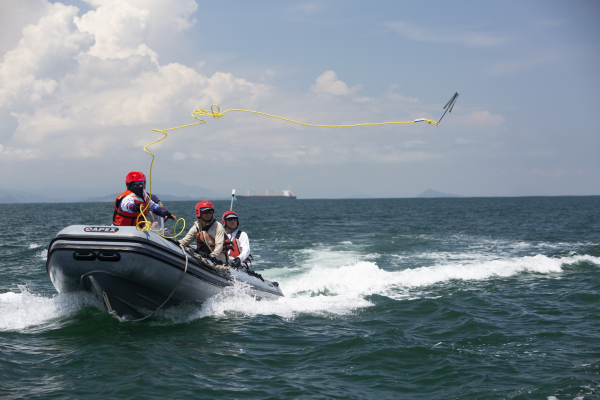Costa Rica holds first entanglement response workshop
in Puntarenas
The first large whale entanglement response workshop in Costa Rica has successfully concluded. The training workshop was held with the assistance of experts from the IWC and the Mexican Whale Disentanglement Network (RABEN), who provided training and equipment.
The two-day event was attended by a diverse group of thirty-four people. Among the participants were members of the Costa Rican coastguard, personnel affiliated with SINAC (Conservation Areas National System), SENASA (National Service of Animal Health), the Pacific Marine Park, researchers from non-profit organisations, and tour operator representatives.
The sessions were guided by the expert trainers and featured a range of response techniques developed specifically for disentangling whales. Participants were trained in the effective use of tools and techniques which were then practiced through simulated exercises conducted both on land and at sea. As ever, the overarching emphasis throughout these exercises was on ensuring human safety. There are very real risks involved in responding to an entangled whale. Teams must work to disentangle rope, net and other bindings from large and often distressed animals whilst at sea and also managing a boat, the ocean swell and weather conditions. These risks are minimised with clear, well-practised safety protocols and informed decision-making.
A regional perspective was provided with local expertise and a representative from SENASA. They highlighted the importance of Costa Rica as a birthing area for humpback whales. The experts also emphasized that the annual reports of whale and dolphin mortality, as well as entanglement in fishing gear, need a proactive approach. Reporting and data are vital to improve understanding of the entanglement threat and support the overall aim of preventing entanglement incidents happening in the first place. In the short-term and where avoidance is not feasible, being well-prepared to respond without jeopardizing human lives is imperative.
This workshop received support from multiple sources, including IWC and WWF Central America, in addition to contributions from local funds. Costa Rica now join other trained Central American countries, such as El Salvador and Panamá, which have previously undertaken entanglement response training. Given that whales migrate without regard for geographical boundaries, it´s important for all countries along their migration routes to be adequately prepared to respond to entanglement reports in a manner that prioritizes the safety and the welfare of the whales.
The Global Whale Entanglement Response Network is an international capacity-building programme. To-date it has trained over 1300 individuals from approximately 40 countries.
Read more about large whale entanglement

